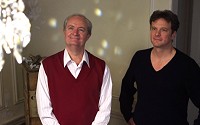
scr David Nicholls
with Colin Firth, Jim Broadbent, Juliet Stevenson, Gina McKee, Elaine Cassidy, Claire Skinner, Matthew Beard, Bradley Johnson, Justin McDonald, Carey Mulligan, Sarah Lancashire, Tilly Curtis
release UK 5.Oct.07, US 6.Jun.08
07/UK FilmFour 1h32

Shining light: Broadbent and Firth



 Based on the memoir by Blake Morrison, this emotional story skilfully outlines the author's troubled relationship with his father. While it's beautifully shot and acted, the film is also somewhat indulgent and meandering.
Based on the memoir by Blake Morrison, this emotional story skilfully outlines the author's troubled relationship with his father. While it's beautifully shot and acted, the film is also somewhat indulgent and meandering.
Blake (Johnson, Beard and finally Firth) has always struggled with the overpowering presence of his father Arthur (Broadbent), who blustered through life without listening to anyone, talking his way to whatever he wanted. His mother (Stevenson) quietly stands by her husband, even when he seems to be having a fling with a family friend (Lancashire). Even as an adult, Blake can't escape his father's control, which more than annoys his wife (McKee). But when Arthur comes down with terminal cancer, the whole family will have to come to terms with him.
Tucker's direction is fluid and emotive, giving the film a thoughtful, introspective tone that allows Arthur's excesses to emerge in sharp contrast. He also adds a terrific sense of time and place, tracing parallel events with background newscasts. For some reason, he films rather a lot of scenes in mirrors, which strangely highlights Morrison's rather wallowing approach, as if he's the only person to have father issues or to face grief in such a complex way. As a result, the strongly emotive final scenes feel both weepy and self-pitying.
Fortunately, the cast is superb. The three actors who play Blake at various stages are excellent, although Firth struggles with some of the internalised scenes, mainly because of the way the screenwriter and director approach them. Stevenson gives another of her quietly rock-solid performances, seemingly contained in the margins of the film. And Broadbent is terrific as the larger-than-life but oblivious Arthur.
The film seems to hinge on a moment in 1989 when Blake receives a writing award, but his father just can't bring himself to say, "Well done." This lifelong lack of support is intriguingly balanced by the inexpressible love his family members feel for him, and which he presumably feels for them. There's an interesting film in here, looking at the realities of family connections, but Nicholls never gives us any kind of universal access. It always feels like we're watching someone else's story.
 |
themes, language | 15.Jun.07 |

 Still waiting for your comments ... don't be shy.
Still waiting for your comments ... don't be shy.
HOME | REVIEWS | NEWS | FESTIVAL | AWARDS | Q&A | ABOUT | TALKBACK
